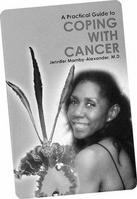
Title: A Practical Guide to Coping with Cancer
Author: Jennifer Mamby-Alexander, MD
Publisher: Jennifer Mamby-Alexander, MD
Reviewed by: Avia Collinder
THERE ARE several ways of approaching a diagnosis of cancer. As demonstrated by a close friend who died earlier this year, one could immediately set one's house in order, that is, review the will, make arrangements for medical and at-home care, make funeral arrangements, and then wait for the final coma that will take one away.
Or, like Jennifer Mamby-Alexander, you can get second and third medical opinions on the state of your health, investigate every procedure that will improve your well-being and allow you to live as comfortably as you can, as long as you can.
Dr Mamby- Alexander, decided to 'fight' when her breast cancer returned as a spreading carcinoma in her chest. It is this fight which she has distilled into well-needed words of advice for those who have been diagnosed with the disease.
A Practical Guide to Coping with Cancer, self-published by Mamby-Alexander this year, is a booklet of 78 pages which, in 24 short and well-laid out chapters, introduces the reader to what they can expect to experience after a diagnosis of cancer.
Effective device
It was an effective device - as the doctor did - to begin with her own story, as it immediately reminds the reader that others are sharing the experience of a cancer diagnosis.
Further, it transmits the message that there is the possibility of living with positive expectations, even after the diagnosis is made.
Dr Mamby-Alexander is an oncologist - specialising in the diagnosis of cancers - and is therefore doubly qualified to do what she does next, which is to compile very practical advice on health and nutrition and coping with the effects of treatment.
But, the first half of the booklet is fully dedicated to the emotional pitfalls of the diagnosis. The crisis caused by being told that you have cancer, in itself, can contribute to an inability to cope.
"Remember always to have an attitude of gratitude," the writer advises. It is this thankfulness for your awareness of your condition and the other true blessings in your life which will contribute to your wellness again.
Coping with Cancer also discusses cancer in men, including breast cancer, and gives practical advice on preparation for surgery, chemotherapy and its after-effects, which include nausea and vomiting.
A chapter which will be much appreciated is that on coping with hair loss, nausea and fatigue.
Self-image changes
Yet another suggests how one can deal with the changes that occur, including changes to self-image, mental changes, changes in fertility and changes to one's finances.
'Sex and Intimacy after a cancer experience', will serve as a guide both to the affected partner and his or her spouse. The reader is also advised that friendships, in general, are important, and that he or she should get involved in groups where support for one's experience will be found, as well as a source of joy.
In the booklet Coping with Cancer, there is also advice for the caregiver and the family of those who have been diagnosed with cancer.
Mamby-Alexander notes that the experience of having cancer can stretch over months, and even years, and so proper planning is needed to ensure that one's social life remains on an even keel.
Make sure, as well, you are still looking good and you are eating the foods that you should, the author notes. These are efforts which might involve staying close to your hairdresser, the gym and your nutritionist.
In the chapter, 'Triumphing Over Cancer', it is noted that once treatment is concluded and all evidence of cancer is gone, one should not live in fear in expectation of its return.
Rehabilitation, Mamby-Alexander writes, might involve job retraining, getting new clothes and fitting prosthesis. "Getting back on your feet should be done gradually and at your own pace," she advises.
Worthwhile fight
Finally, the oncologist concludes with more of her own story, this time itemising the numerous challenges encountered in getting a complete diagnosis and proper care. The fight has been worthwhile, she says, as she has been able to enjoy new wellness and contribute to the lives of her three sons and her mom.
Mamby-Alexander's book is dedicated in part to parents Isola and Edward Milton Mamby, who taught her, she says, to "love and climb very mountain".
Her book was obviously crafted with the love of taking on a good challenge, coupled with a love of self.
A Practical Guide to Coping with Cancer is an easily digestible instruction manual on navigating the chilling waters of a diagnosis in which so many might otherwise drown.

